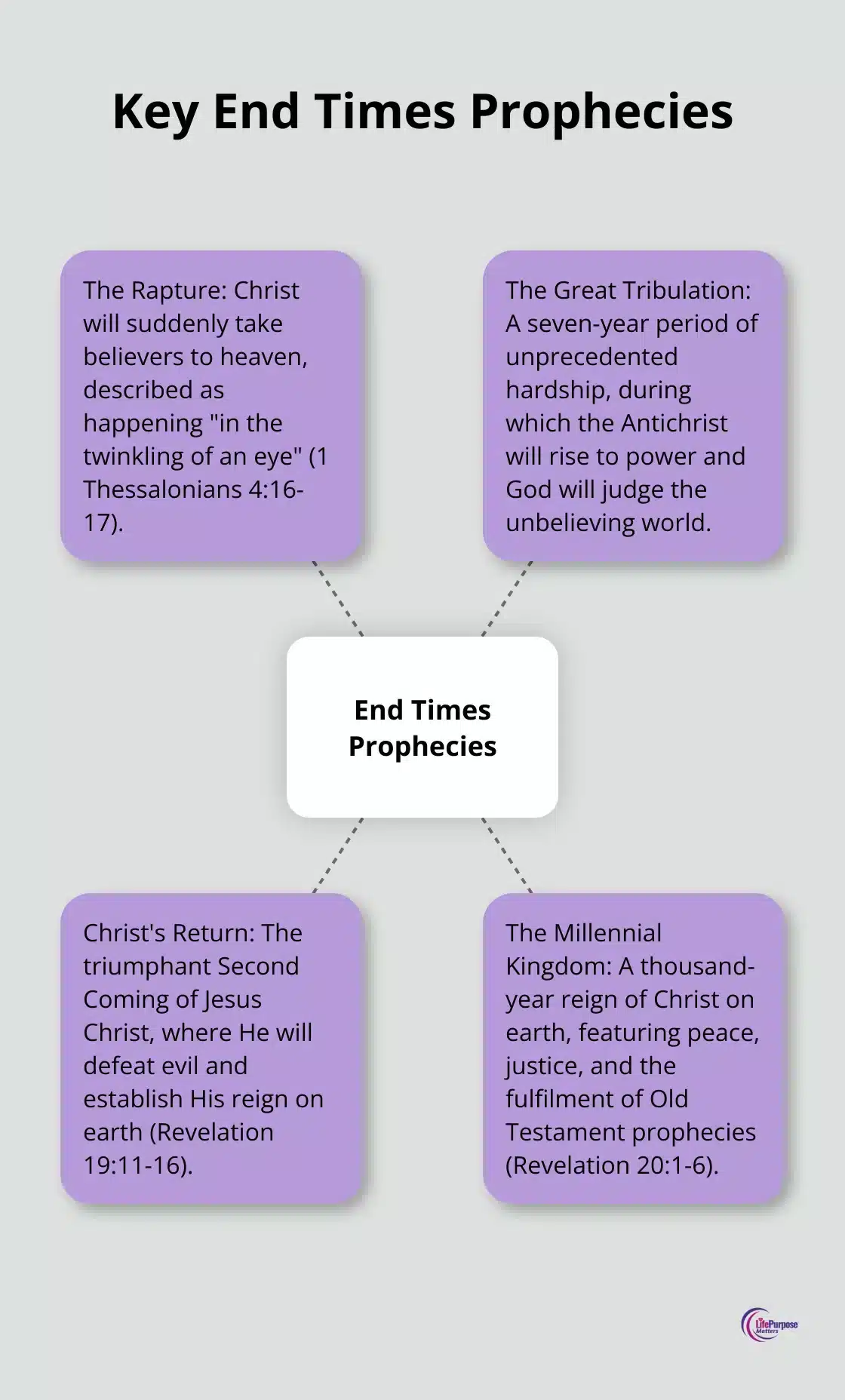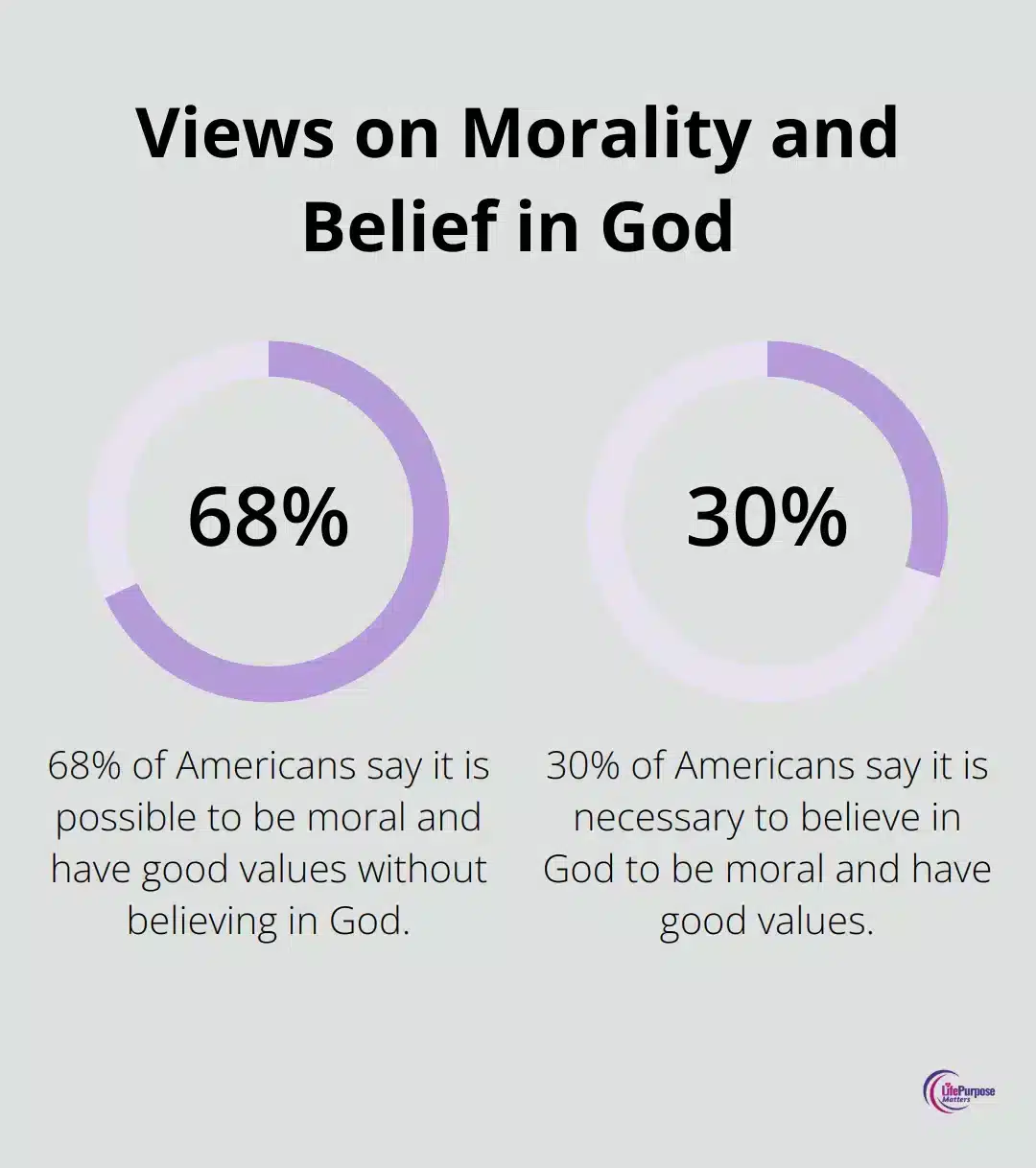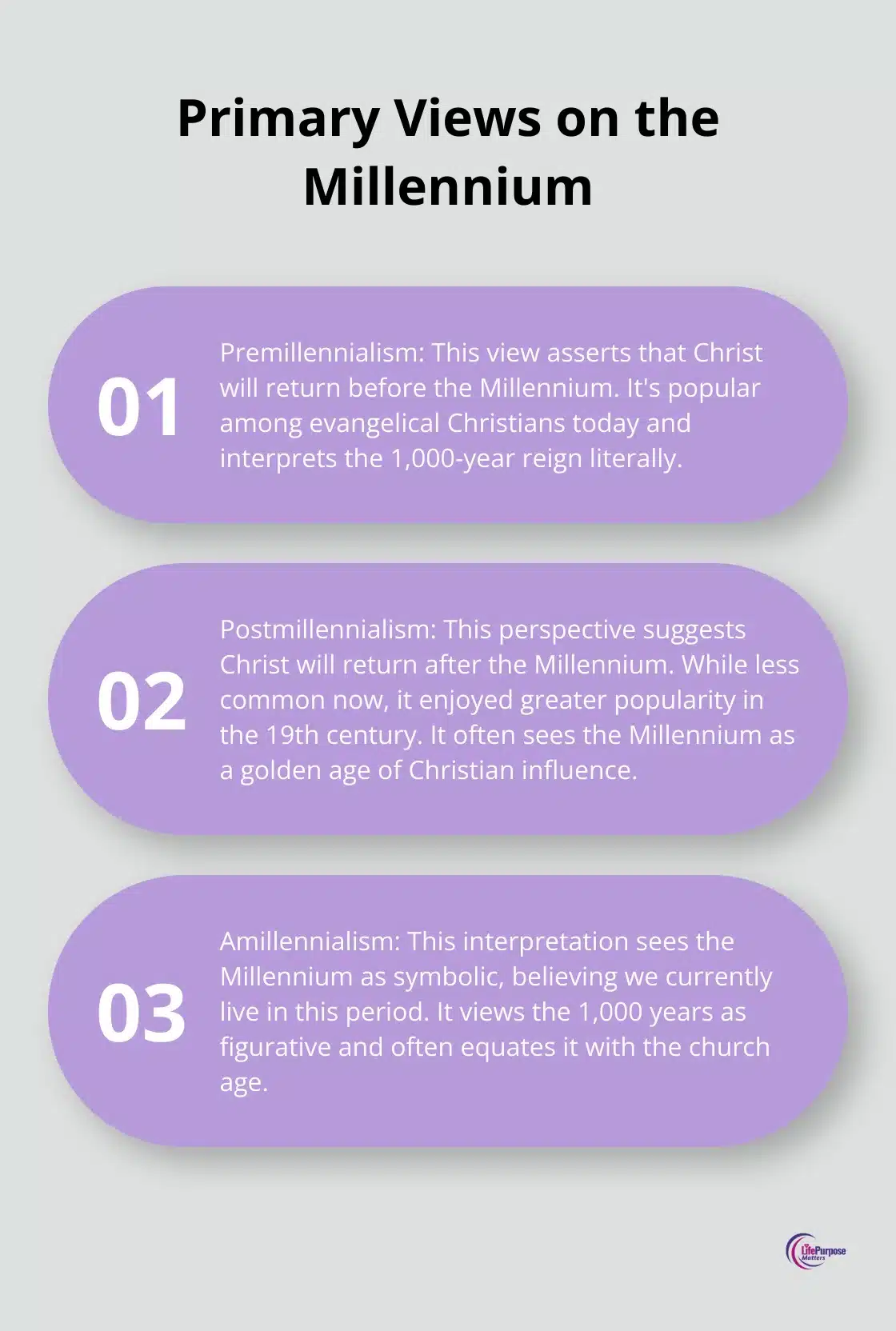Ever wondered what the Bible says about the end times? You’re not alone. At Life Purpose Matters, we’ve seen a growing interest in end times prophecy. This blog post will explore key biblical prophecies, signs to watch for, and different interpretations of these events. We’ll also discuss how understanding these prophecies can impact our faith and daily lives.
Table of Contents
ToggleKey End Times Prophecies in the Bible
The Bible outlines several major events that will unfold during the end times. Understanding these prophecies can strengthen our faith and prepare our hearts for what’s to come.

The Rapture: A Sudden Departure
The Rapture marks a pivotal event where Christ will take believers to heaven. As described in 1 Thessalonians 4:16-17, this event will happen “in the twinkling of an eye.” While debate exists about its timing, many Christians believe it will precede the Great Tribulation.
The Great Tribulation: Unprecedented Hardship
The tribulation is a future seven-year period when God will finish His discipline of Israel and finalise His judgement of the unbelieving world. During this time, the Antichrist will rise to power, and God will pour out His judgements on the earth.
Christ’s Return: The Ultimate Victory
The climax of end times prophecy culminates in the Second Coming of Christ. The second coming of Jesus Christ is the hope of believers that God is in control of all things, and is faithful to the promises and prophecies in His Word. Revelation 19:11-16 vividly portrays this triumphant return, where Christ will defeat the forces of evil and establish His reign on earth.
The Millennial Kingdom: A Thousand Years of Peace
Christ will establish a thousand-year reign on earth (often referred to as the Millennial Kingdom) after His return. This period, described in Revelation 20:1-6, will feature peace, justice, and the fulfilment of many Old Testament prophecies about Israel’s restoration.
Understanding these prophecies transcends mere knowledge of future events. It compels us to live with purpose and urgency today. Grasping these truths should motivate us to share the Gospel, live holy lives, and eagerly anticipate Christ’s return.
As we look at these key prophecies, we must also consider the signs that indicate we might be approaching these end times events. Let’s explore some of these signs in the next section.
Are We Nearing the End Times?
Global Conflicts and Natural Calamities
Jesus spoke of wars, rumours of wars, and natural disasters as signs of the end times (Matthew 24:6-7). Today, we witness ongoing conflicts and an increase in severe weather events. The World Economic Forum’s Global Risks Report 2023 defines “global risk” as the possibility of the occurrence of an event that can cause significant negative impact across countries and industries.
Spiritual and Moral Challenges
Paul’s warning in 2 Timothy 3:1-5 about the decline of morality in the last days seems eerily relevant today. We see a growing rejection of traditional values and an increase in self-centred behaviour. A recent survey finds that 68% of Americans say it is possible to be moral and have good values without believing in God, while only 30% say it is necessary to believe in God to be moral and have good values.

Global Governance and Economic Systems
The Bible speaks of a future one-world government (Revelation 13:7-8). While we haven’t reached that point yet, we see increasing global interconnectedness. The World Economic Forum’s push for a “Great Reset” and discussions about a global digital currency are developments worth watching.
Technology and Potential for Control
Advances in technology, particularly in the realms of artificial intelligence and biometrics, raise questions about the potential for a system like the Mark of the Beast (Revelation 13:16-17). We should approach current events with caution and avoid over-interpretation. However, it’s wise to stay informed about technological developments that could impact personal freedoms.
The Call to Discernment
As we examine these signs, it’s essential to approach them with a balanced perspective. While many believe we live in the last days, we must ground our understanding in Scripture and current events. The Bible calls us to be watchful and discerning (Matthew 24:42), not fearful or speculative.
These signs should motivate us to deepen our faith and share the Gospel with urgency. However, we must avoid fear-mongering or setting dates for Christ’s return. Instead, let’s focus on living out our faith authentically and being ready for His coming, whenever that may be.
As we consider these signs of the end times, it’s natural to wonder how we should interpret them. In the next section, we’ll explore different schools of thought on end times prophecy and discuss the importance of context in biblical interpretation.
How to Interpret End Times Prophecy
End times prophecy interpretation requires a balanced approach to deepen faith and motivate purposeful living. At Life Purpose Matters, we believe in examining different viewpoints and maintaining a grounded perspective when studying these complex biblical passages.
Different Views on the Millennium
The Millennium refers to the period of 1,000 year reign of Christ mentioned in Revelation 20:1-4. This passage is notoriously difficult to interpret and has sparked significant debate in end times prophecy. Three primary views exist:

- Premillennialism: This view asserts that Christ will return before the Millennium. It’s popular among evangelical Christians today.
- Postmillennialism: This perspective suggests Christ will return after the Millennium. While less common now, it enjoyed greater popularity in the 19th century.
- Amillennialism: This interpretation sees the Millennium as symbolic, believing we currently live in this period.
The Importance of Context
Context plays a vital role when studying end times prophecy. We must consider the historical, cultural, and literary context of each passage. For example, the book of Revelation uses apocalyptic language common in Jewish literature of its time. Understanding this can help avoid overly literal interpretations that might miss the point.
Avoiding Sensationalism
End times prophecy fascinates many, but we must guard against sensationalism or date-setting. Jesus Himself stated that no one knows the day or hour of His return (Matthew 24:36). Instead of trying to pinpoint exact dates, we should focus on readiness at all times.
Balancing Prophecy Study
To stay grounded, try to balance prophecy study with other aspects of Christian living. For every hour spent studying Revelation, spend an equal amount of time in the Gospels or Epistles, focusing on how to live out your faith daily.
The Purpose of Prophecy
Prophecy’s purpose isn’t to satisfy curiosity about the future, but to motivate faithful living in the present. As we study these prophecies, we should keep our focus on growing in our relationship with Christ and sharing His love with others.
Final Thoughts
End times prophecy offers hope and inspires preparedness in the face of global uncertainty. It reminds us that God controls all events, even when chaos seems to reign. This knowledge should transform our daily lives, motivating us to align our actions with God’s will and share His message with renewed passion.
At Life Purpose Matters, we strive to help you apply these profound truths to your life. We believe that understanding end times prophecy can deepen your faith and sharpen your focus on what truly matters. Our goal is to equip you with the tools to live purposefully in light of Christ’s promised return.
As we anticipate Christ’s return, let’s focus on faithful stewardship of our time and talents. May we live with intention, share the Gospel boldly, and eagerly await the day we’ll see our Saviour face to face (without fear or anxiety). End times prophecy should fill us with hope and drive us to make a positive impact in our world today.

